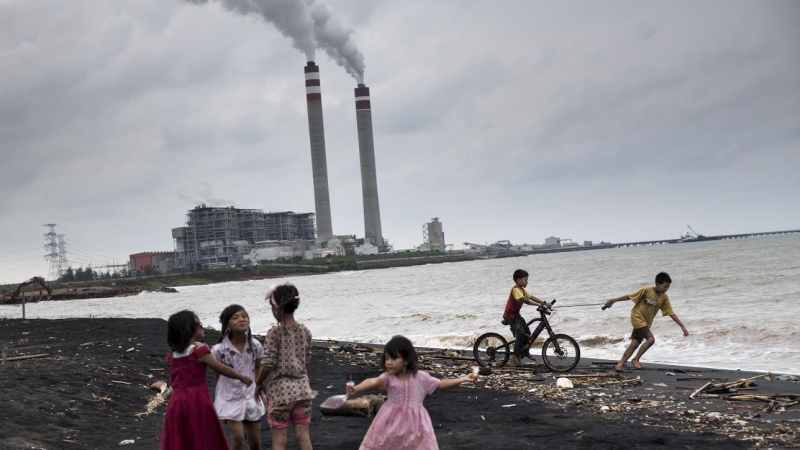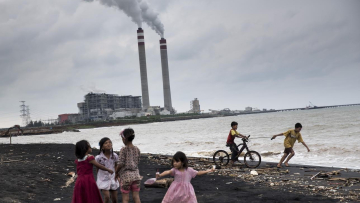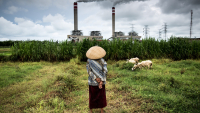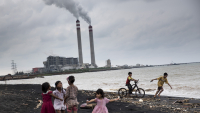Project – On record
This profile is no longer actively maintained, with the information now possibly out of dateBankTrack

Project – On record
This profile is no longer actively maintained, with the information now possibly out of dateBankTrack
What must happen
In December 2015, an analysis by Climate Action Tracker (CAT) of proposed and existing coal plants, based on the Global Coal Plant Tracker (CAT 2015a), concluded that if we are to avoid the worst effects of climate change, further construction of coal plants must be avoided, and existing plants must be phased out by mid-century. Even with no new coal plant construction, emissions from coal-fired power generation in 2030 would still be 150 percent higher than what is consistent with scenarios limiting warming to below 2°C (CAT 2015a).
The Tanjung Jati-B power plant is expected to be responsible for the premature death of 1,200 Indonesians a year and will also be responsible for emitting large amounts of CO2 into the environment. Sumitomo should immediately withdraw its investment in the project and indeed any further extensions. All financial institutions involved should also withdraw immediately from the proposed 2,000 megawatt extension.
| Sectors | Coal Electric Power Generation |
| Location |
|
| Status |
Planning
Design
Agreement
Construction
Operation
Closure
Decommission
|
| Website | http://www.tjbservices.com/ |
|
|
This project has been identified as an Equator Project |
Tanjung Jati B power station is a 2,640 megawatt coal-fired power plant located in Central Java Province, Indonesia. PT Central Java Power, the project's developer, started its operations in 2006. The power station comprises four 660 megawatt generating units. Tanjung Jati Coal Terminal serves the power station. PT Central Java Power is extending the power plant with two 1,000 megawatt units. The project's sponsors are: Sumitomo Corporation, KEPCO (Kansai Electric Power Co.) and PT United Tractors, the mining unit of Indonesia's Astra Group.
Impact on human rights and communities
The local fishing community are among the strongest opponents of the proposed expansion to Tanjung Jati-B. The Fisherman Association of Indonesia and the North Jepara Fishermen group have complained of reduced catches since the plant has been in operation. Furthermore of damage to the coral reef; collisions between fishing boats and coal transport barges and the lack of filters for water intake so fish are sucked into the cooling system. The fishermen have also complained that the coal company has failed to meet the standards it had set when Units 3 & 4 were opened in 2007 (see this webpage in Bahasa).
Air pollution, health impacts In 2015, Greenpeace and Harvard University modelled the health impacts of air pollution from coal-fired power plants in Indonesia. The findings were extraordinary: Existing coal-fired power plants in Indonesia cause an estimated 6,500 premature deaths every year. Each large new power plant with a 1000 megawatt capacity, is expected to result, on average, in the deaths of 600 Indonesians every year. With Indonesia's plans to build over a hundred new coal-fired power plants, this death toll could rise to 28,300 people every year if all plans are implemented.
The risks include strokes, heart disease, chronic obstructive pulmonary disease, lung cancer and cardiovascular and other respiratory diseases. It is not only the old who are at risk. Indonesia's coal industry is believed to be causing the deaths of about 100 young children every year, from acute respiratory infections. Of particular concern is toxic particulate matter (PM2.5): microscopic particles which are small enough to enter the bloodstream and are linked to respiratory illnesses and lung damage.
The Tanjung Jati-B power plant is estimated to be responsible for 1,020 premature deaths per year, according to the Harvard research, even though the power plant was assumed to meet national environmental standards. Young children are at risk. Tanjung Jati-B causes the deaths of an estimated 20 children under five every year, because of respiratory infections caused by air pollution from the plant.
Impact on climate
Indonesia's coal production reached 392 million tons in 2015, according to the Ministry of Energy and Mineral Resources. Nearly three quarters of this production was exported, so it is not only generating huge greenhouse gas emissions at home; it is generating them overseas. The country has plans to expand its coal-fired power generation, even though coal use has already doubled in the past decade. This will rapidly increase emissions and bind the country to a carbon-intensive form of energy for years.
Impact on nature and environment
Water usage Tanjung Jati B operates a cooling system using salt water from the ocean, the Java Sea. This has less impact on local water resources than a freshwater system, but its effect cannot be discounted. Once-through cooling systems take water from nearby sources, in this case, the Java Sea, circulate it through pipes to absorb heat from the steam and discharge the now warmer water to the ocean. A 500 megawatt sub-critical coal-fired power plant would draw around 500 million m3 of water a year, so Tanjung Jati-B is currently withdrawing about 2,500 million m3 from the ocean.
The thermal impact from coal power plants on ocean ecosystems have been documented over many years, including by the UNEP. The discharged water is warmer than the sea, and is having an impact on local fishermen, who have spoken out strongly against the expansion of Tanjung Jati B. They say the company has failed to meet the standards in its EIA for Units 3 & 4, including failing to put a filter on the water intake pipe so that small fish were getting sucked in, reducing the fishermen's catches.
Other impacts
On February 27, 2017, it was announced that JBIC and a consortium of commercial banks reached financial close on TJB2. The full list of financiers, for a total financing amount of around USD 3.355 billion, comprises: JBIC, Bank of Tokyo-Mitsubishi UFJ, Mizuho, Sumitomo Mitsui Banking Corporation, Sumitomo Mitsui Trust, Mitsubishi UFJ Trust and Banking Corporation, Norinchukin Bank and OCBC.
Units 3 and 4, costing USD2.08 billion, were funded by JBIC and co-financed by Bank of Tokyo-Mitsubishi UFJ, Sumitomo Mitsui Banking Corp and BNP Paribas.
In a Project Finance International article in January 2016, it was mentioned that "Two French banks - Credit Agricole and Societe Generale - are understood to have joined the lending group for the expansion of Tanjung Jati B (TJB2) coal-fired power plant, following the withdrawal of BNP Paribas. They are joining BTMU, Mizuho Bank, SMBC and Sumitomo Trust. "
In January 2017, Credit Agricole announced that the conditions linked to the financing of this project were not fulfilled and that the bank is not involved any more in TJB2 because of its new commitment not to finance any new coal plant project worldwide. The same applies to Société Générale.
The companies will finance the roughly $4 billion Tanjung Jati B expansion on a roughly 80:20 debt-to-equity ratio:
- JBIC: $1.7 billion
- syndicate of seven private sector banks: $1.7 billion
Nippon Export and Investment Insurance (NEXI) will be insuring the $1.7 billion loan provided by the syndicate of seven private sector banks. SMBC is financial adviser while Latham & Watkins is legal adviser.
Applicable norms and standards
2020
2020-03-08 00:00:00 | Construction of units 5 & 6 delayed due to covid-19
The construction of the new power plant units seemed to steadily make progress as in July 2019 it was reported that construction of Unit 5 and Unit 6 was 75% complete.[19]
However, in March 2020 the project's sponsor announced that it might be delayed as a result of the COVID-19 pandemic.
2017
2017-03-31 00:00:00 | Construction of TJB-2 coal-fired power plant units 5 & 6 expansion project has started
Sumitomo Corporation together with The Kansai Electric Power Co., have achieved the required conditions precedent for the project financing of the Tanjung Jati B coal-fired power plant Units 5&6 Expansion Project in Indonesia and commenced construction work on the Project on March 31, 2017. The project has been developed together with PT United Tractor Tbk, an affiliate company of the largest Indonesian conglomerate Astra Group (source Sumitomo Corporation).
2015
2015-12-21 00:00:00 | Tanjung Jati-B coal-fired power plant Unit 5 & 6 Expansion Project
Sumitomo Corporation, jointly with the Kansai Electric Power Co., and PT United Tractors, an affiliate company of the Indonesian largest conglomerate Astra Group, have come to an agreement to develop Tanjung Jati B coal-fired power plant Unit 5 & 6 Expansion Project and signed the power purchase agreement with PT. PLN, Persero, an Indonesian state electricity company. The total project cost is expected to be JPY500 billion, mainly funded by project finance.





